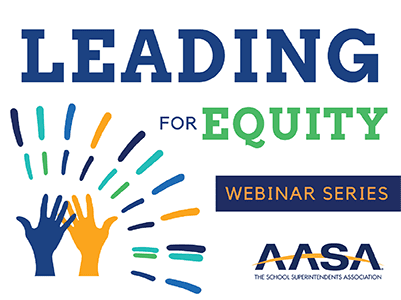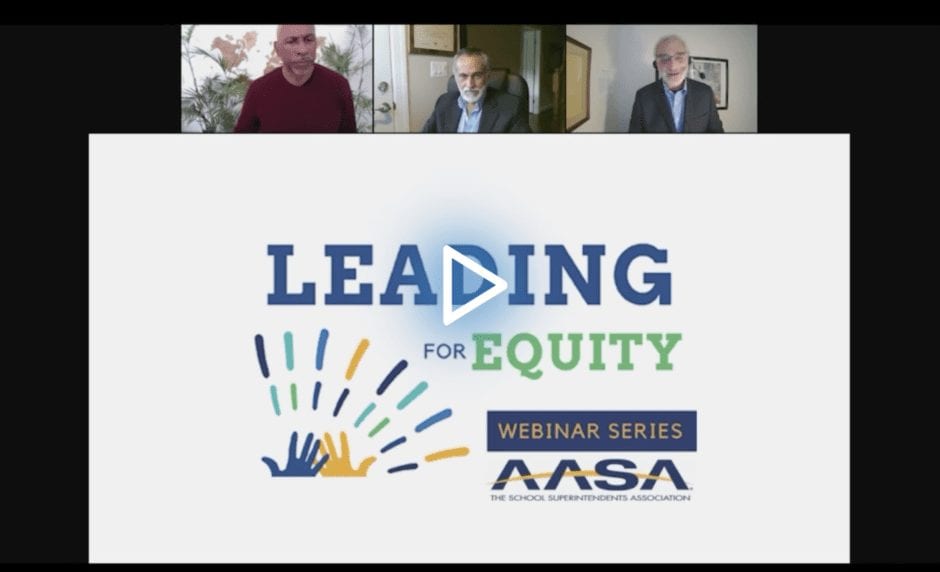Seeing the Pandemic as an Opportunity for Change
By Stacey Pusey
The pandemic, while a great disruption in schools, is also an opportunity for change. According to presenters of a recent edWebinar, hosted by AASA, The School Superintendents Association and AASA’s Leadership Network, as school leaders look to reopen their schools, they shouldn’t just be focused on logistics. In addition, they need to ask themselves: Is my school truly responsive to student needs, and if not, how can I make the school work for all students?
In order to address education equity, administrators must first recognize the common barriers.
- Complacency: This is accepting the schools as they are, ignoring the barriers, and blaming kids, parents, teachers, etc. without really looking for the root cause of the issues.
- Racial bias: Does the school have internalized biases and stereotypes? Does everyone feel valued?
- Disconnection between teaching and learning: Teachers often confuse covering the material with teaching to the kids—if they teach to understanding, then the classroom becomes a different environment.
- Punitive mindset in grading and providing feedback: The key is to look at the staff culture and think about changing teachers’ mindsets so they are focused on not just grading assignments but truly helping students learn.
- Unequal access to external support: Staff can’t just assume students will have access to the same resources at home or that they will willingly talk about what they have and don’t have. They need to develop relationships with each student, learn about their individual situations, and help them as needed.
- Ignoring the effects of inequality outside of school: Similarly, school leaders need to be attuned to the community’s needs.
To pursue equity, schools must understand three key principles.
- A holistic approach to child development, education, and differentiated support – This is a chance to make classrooms developmentally conducive to learning.
- Neuroscience proves all children have the ability to learn – By encouraging deeper learning, we are helping them grow their learning potential.
- Context – Staff must understand and address how factors outside of school are impacting student learning.
“I think for the last 20 years,” said Pedro A. Noguera, Ph.D., Emery Stoops and Joyce King Stoops Dean of the USC Rossier School of Education, “we’ve been focused on the wrong question: How [do we] raise student achievement? … Achievement is the outcome. The question we should have been asking is: How do we get kids excited about learning?” To facilitate this change post pandemic, he suggested a list of questions each leader must answer.
- How will your school support the mental health needs of students?
- How will we address gaps in learning, unmotivated students, and frightened adults?
- Are your teachers prepared to address heightened awareness about racial injustice?
- How will you build a strong sense of community?
- What will you need to know about the children in order to address their needs?
Most importantly, while there is a lot of technical work involved in reopening the schools, leaders shouldn’t lose sight of the adaptive work of creating an educational environment that works for all students.
This edWeb broadcast was hosted by AASA, The School Superintendents Association and AASA’s Leadership Network, providing premier professional learning for educational leaders.
About the Presenter
Pedro A. Noguera, Ph.D. is the Emery Stoops and Joyce King Stoops Dean of the USC Rossier School of Education.
A sociologist, Noguera’s research focuses on the ways in which schools are influenced by social and economic conditions, as well as by demographic trends in local, regional, and global contexts. He is the author, co-author, and editor of 13 books. His most recent books are The Crisis of Connection: Roots, Consequences and Solutions with Niobe Way, Carol Gilligan and Alisha Ali (New York University Press, 2018) and Race, Equity and Education: Sixty Years From Brown with Jill Pierce and Roey Ahram (Springer, 2015).
He has published over 250 research articles in academic journals, book chapters in edited volumes, research reports, and editorials in major newspapers. He serves on the boards of numerous national and local organizations, including the Economic Policy Institute, the National Equity Project, and The Nation. Noguera appears as a regular commentator on educational issues on several national media outlets, and his editorials on educational issues have appeared in The New York Times, The Washington Post, The Wall Street Journal, The Dallas Morning News, and Los Angeles Times.
Prior to being appointed Dean of the USC Rossier School of Education, Noguera served as a Distinguished Professor of Education at the Graduate School of Education and Information Studies at the University of California, Los Angeles. Before joining the faculty at UCLA he served as a tenured professor and holder of endowed chairs at New York University (2004–2015), Harvard University (2000–2003), and the University of California, Berkeley (1990–2000).
Noguera was recently appointed to serve as a special advisor to the governor of New Mexico on education policy. He also advises the state departments of education in Washington, Oregon, and Nevada. From 2009–2012 he served as a trustee for the State University of New York as an appointee of the governor. In 2014 he was elected to the National Academy of Education and Phi Delta Kappa honor society, and in 2020 Noguera was elected to the American Academy of Arts and Sciences. Noguera has received seven honorary doctorates from American universities, and he recently received awards from the Center for the Advanced Study in the Behavioral Sciences at Stanford University, from the National Association of Secondary School Principals, and from the McSilver Institute for Poverty Policy and Research at NYU for his research and advocacy efforts aimed at fighting poverty.
About the Hosts
Dr. Daniel A. Domenech
Dr. Daniel A. Domenech has served as Executive Director of AASA, The School Superintendents Association since July 2008. Domenech has more than 36 years of experience in public education, twenty-seven of those years served as a school superintendent.
Prior to joining AASA, Domenech served as senior vice president for National Urban Markets with McGraw-Hill Education. In this role, he was responsible for building strong relationships with large school districts nationwide.
Prior to his position at McGraw-Hill, Domenech served for seven years as superintendent of the Fairfax County, Va., Public Schools, the 12th largest school system in the nation with 168,000 students.
Domenech, an AASA member since 1979, served as president of AASA from July 1998 to June 1999. He is also a past president of the New York State Council of School Superintendents, the Suffolk County Superintendents Association, and the Suffolk County Organization for Promotion of Education. He was the first president and co-founder of the New York State Association for Bilingual Education.
In addition, Domenech has served on the U.S. Department of Education’s National Assessment Governing Board, the advisory board for the Department of Defense schools, the board of directors of the Association for the Advancement of International Education, the Board of Overseers for the Baldrige Award and the boards of the Institute for Educational Leadership, National Board for Professional Teaching Standards, Sea Research Foundation, and Education Policy Institute. Currently, he serves on the boards of the Learning First Alliance, National Student Clearinghouse, Center for Naval Analyses, Horace Mann Educators Corporation, ACT, USAC, and board chair for Communities in Schools of Virginia.
Dr. Morton Sherman
Dr. Morton Sherman has more than 30 years’ administrative experience in raising academic standards, closing achievement gaps, and uniting stakeholders He has served in public education for over 40 years, 25 as a public school superintendent of schools.
Now serving as the AASA Associate Executive Director for Leadership Network, he is responsible for programs that support aspiring and sitting superintendents. Recent initiatives include the creation of the AASA Collaborative, The Urban Superintendents Academies in cooperation with Howard University and the University of Southern California, Superintendents Consortium on Personalized Learning, and the Aspiring Superintendents Program.
Sherman’s service includes superintendent for eight years in Cherry Hill, N.J., where he was a founding member of the Southern New Jersey Standards Initiative and the Delaware Valley Minority Achievement Consortium. Sherman was superintendent for South Orangetown Central School District in N.Y. for five years; superintendent and principal at the Norwich Free Academy in Conn. for four years; superintendent in Tenafly, N.J.; and assistant superintendent in Westport, Conn. He began his career as a middle and high school English teacher.
As superintendent of the Alexandria City Public Schools in Va., from 2008-2013, Sherman helped implement significant improvements, including academic plans for secondary students, professional learning plans tied to student outcomes and the district strategic plan, an International Academy for English Language Learners, revised professional evaluation systems, the introduction of AVID and IB, the creation of a Family and Community Engagement (FACE) Center, a School-Based Health Clinic, and a pre-K initiative.
Join the Community
Leading for Equity is a free professional learning community on edWeb.net for school and district leaders who face many challenges leading schools and driving school improvement for all students, especially now with COVID-19.
The AASA Leadership Network drives superintendent success, innovation, and growth, shaping the future of public education while preparing students for what’s next. We are the largest, most diverse network of superintendents in America. Passionate and committed, we connect educational leaders to the professional learning, leadership development, relationships, and partnerships they need to ensure a long career of impact.
Stacey Pusey is an education communications consultant and writer. She assists education organizations with content strategy and teaches writing at the college level. Stacey has worked in the preK-12 education world for 20 years, spending time on school management and working for education associations including the AAP PreK-12 Learning Group. Stacey is working with edWeb.net as a marketing communications advisor and writer.






Comments are closed.